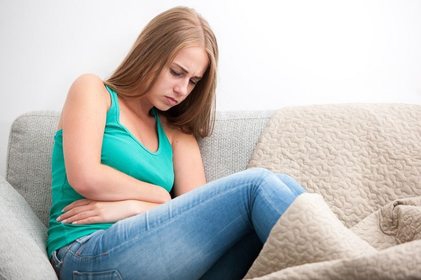Leading up to the period, it is common to experience various PMS symptoms, including cramps, abdominal pain, bloating, diarrhea, constipation, headaches, weight gain due to fluid retention, or increased appetite. Being constipated before period is fairly common, but the good news is that experts understand why it occurs. Once you understand the reasons, it is easy to learn about prevention of constipation and avoid this issue before your menstrual cycle. It will only take a few simple steps in most cases and you can even use these method to prevent similar symptoms no matter what stage in your cycle you are at.

Why Am I Constipated Before Period?
The menstrual cycle is a complicated process involving two crucial hormones: progesterone and estrogen. Right before menstruation begins, the body experiences a surge in progesterone which will then drop when bleeding begins. This hormone, progesterone, is responsible for affecting the digestive system. It can delay food on its path through the intestines, causing constipation before period. In most cases, this constipation will ease up as menstruation begins.
Some women will only experience constipation close to their menstrual cycles, while others will notice it at other times of the month as well. No matter the case, there are methods of easing constipation symptoms as well as preventing them from recurring in the future.
How to Relieve Constipation Before Period
Have More Fiber
The best way to relieve your constipation before period is to increase your consumption of fiber by eating more fruit, vegetables, high fiber cereals, and whole wheat bread.
Eat Peas and Beans
Both peas and beans contain high amounts of fiber, which will add bulk to your stools while increasing their water content. This makes the transition through your digestive system smoother, reducing constipation. You can easily add these foods to rice dishes and salads and options include black, lima, kidney, cannellini, and butter beans.
Limit Refined Sugars and Salt
If your diet currently includes many processed foods, you will need to reduce this as much as possible, particularly close to your period. Examples of processed foods include fast food meals, burgers, prepared or readymade meals (such as microwave ones), ham, bacon, and Salami. The foods contain large amounts of refined sugars and salts, which can affect both digestion and hormones. Also avoid adding sugar or salt to food and drinks as it can quickly accumulate.
Drink Water
Hydration is crucial as water ensures your digestive system and the rest of your body works at its optimum level. The digestive system requires water to help effectively break down food, move it throughout your intestines, mold it to create stools, and easily eliminate it, which prevents constipation before period.
As a bonus, drinking more water will reduce your fluid-retention, another symptom of PMS. Simply carry a water bottle with you and remember to drink enough.
Reduce Caffeine and Alcohol
Both caffeine and alcohol have been linked to digestive stress and difficulties. Therefore, reducing your consumption of these items around our period will help ease constipation.
Work Out Regularly
You should also aim to work out regularly, particularly around your period. Getting regular cardio exercise improves circulation, which in turn boosts bowel regularity.
OTC Products
If you try the above methods and still experience constipation before period, you can try over-the-counter medications. Don’t, however, regularly take powerful laxatives as your bowels will get used to them, not working properly without these medications. You won’t need a stimulant or powerful laxative like senna and bisacodyl for occasional constipation before period. Instead, opt for ispaghula husk (Fybogel) or perhaps lactulose (Duphalac). This sweet liquid lets you adjust the dose to your exact specifications, taking between 5 and 15 milliliters either once or twice each day for several days.
Here you can find more home remedies to relieve constipation before period such as olive oil.
Other Symptoms You Might Experience Before Period
The most common symptom associated with premenstrual syndrome is bloating. Premenstrual syndrome (known as PMS) is used to describe the emotional and physical symptoms women experience immediately before their period every month. This condition tends to be the worst about one or two weeks before the period starts and will typically disappear once the period actually begins.
In addition to constipation before period and bloating, other symptoms of PMS include trouble sleeping, feeling tense, difficulty handling stress or concentration, mood swings, irritability, depression, food cravings, diarrhea, headaches, sore breasts, backaches, fatigue, and acne.
How to Find Relief
To help prevent these symptoms as well as the constipation associated with your period, try to avoid caffeine as it can increase anxiety and jumpiness. Instead, aim to get plenty of sleep every night.
It can also help sometimes to take a daily multivitamin or evaluate your diet to ensure that you are getting enough calcium.
Many women also notice improvement in the symptoms by practicing meditation or other stress-relief techniques as well as daily exercise.
You should also try to follow a balanced diet that includes plenty of fresh fruits and/or vegetables. At the same time, avoid processed foods like crackers and chips.
Over-the-counter pain medications such as ibuprofen can help relieve some of the symptoms associated with premenstrual syndrome, such as back or headaches. In the case of serious PMS-related pain, visit your doctor. He may be able to recommend a prescription pain reliever or suggest birth control pills to reduce some of the symptoms.

View All Comments /Add Comment